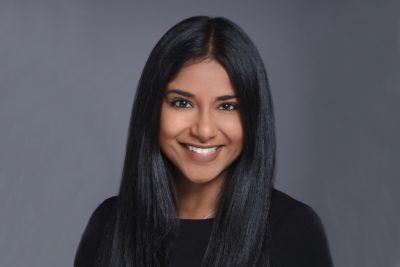
Natasha Raj-Derouin (Photo courtesy of Natasha Raj-Derouin)
In this series of alumni profiles, we highlight graduates of USC’s master of science program in stem cell biology and regenerative medicine. Our accomplished alumni have pursued many different paths—ranging from a biotech industry job to a teaching career, and from a PhD program to professional degrees in medicine, dentistry, and law. As the 41 master’s students in the Class of 2022 prepare for graduation, we look forward to welcoming them into our vibrant, diverse, and growing community of alumni. Congratulations Class of 2022, and Fight On!
–Francesca Mariani, master’s program director
When Natasha Raj-Derouin (née Natarajan) was doing her medical school rotations at Columbia University in New York City, she was thrilled to find a subspecialty that incorporated some of the lessons she had learned in the master’s program in stem cell biology and regenerative medicine at USC.
“What’s been really great is that there is a subspecialty within OB-GYN called Reproductive Endocrinology and Infertility or REI, and it’s a field that has a huge basis in basic science,” she said. “A lot of the work we do has to do with embryology and an understanding of stem cell biology, to help fertilize embryos in vitro and then implant them into a patient.”
Raj-Derouin first fell in love with stem cell research when she was taking AP Biology at Beverly Hills High School. As a prize for winning a writing competition hosted by Cedars-Sinai Medical Center, she was awarded the opportunity to work in the UCLA laboratory of Jianyu Rao, who was studying how green tea affects stem cells.
As an undergraduate at USC, Raj-Derouin took the course MEDS 380 Stem Cells: Fact or Fiction, taught by Gage Crump, associate professor of stem cell biology and regenerative medicine. Before long, she had joined the Crump Lab and co-authored a study in Frontiers in Developmental and Cell Biology about how zebrafish regenerate arthritic joints.
She went on to pursue USC’s progressive master’s degree in stem cell biology and regenerative medicine, before entering medical school at Columbia University.
When COVID interrupted her clinical rotations for three months, she worked as a volunteer with postpartum women who had been sent home from the hospital immediately after giving birth.
“Women were being discharged right after they had a baby without getting the full explanation of postnatal care, because the hospitals were in a place where they were really trying to keep beds open,” she said. “So I would call women postpartum and just check up on them to make sure they had the information they needed, and that none of their symptoms were alarming enough that they should go back to the hospital. So that was a way to both help out, and stay in touch with patients to continue learning.”
As a medical student, she also conducted clinical research exploring whether or not different oxygen levels experienced by IVF embryos affect live birth rates.
In June, she will begin a four-year residency in OB-GYN at Kaiser Permanente in Los Angeles, with plans to pursue an additional three-year fellowship in REI. Eventually, she intends to practice medicine in an academic setting in California, where she and her husband have family in both Los Angeles and the Bay Area. In addition, she hopes to pursue research about how to enable same sex couples to have biological children, get involved in medical education, or advise about ethical, regulatory and legislative issues related to the rapidly evolving field of REI.
“It was great to find this field where I can be a physician and create very long-standing relationships with patients, and where I can still think deeply about the science and try to be creative,” she said. “So it’s really cool to be able to feel like I get the best of both worlds.”